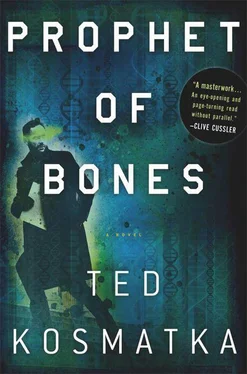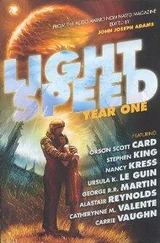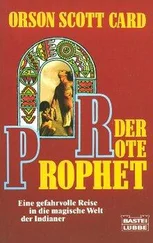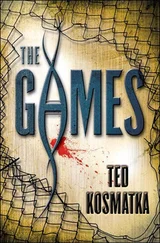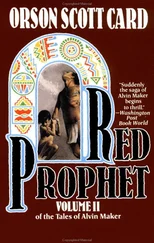“I’ll leave you two to your discussion,” Mr. Lyons said, excusing himself.
“Please,” Paul gestured to a nearby worktable. “Take a seat.”
Gavin sank onto the stool and set his briefcase on the table. “I promise I won’t take much of your time,” he said. “But I did need to talk to you. We’ve been leaving messages for the last few days and—”
“Oh.” Paul’s face changed. “You’re from—”
“Yes.”
“This is highly unusual.”
“I can assure you, these are unusual circumstances.”
“Still, I’m not sure I like being solicited for one job while working at another.”
“I can see there’s been a misunderstanding.”
“What misunderstanding?”
“You called it a job,” Gavin said. “We just want to borrow you, not hire you away. Consider it a temporary change of pace—a transfer position.”
“Mr. McMaster, I currently have more than a full workload. I’m in the middle of a project, and to be honest, considering the backlog we’re dealing with, I’m surprised Westing let you through the door.”
“Is that what you’re worried about?” Gavin smiled. “Your company is already on board. They’ve granted you a… let’s call it a sabbatical of sorts. I took the liberty of speaking to management before contacting you. They were very accommodating.”
“How did you…” Paul looked at him, and Gavin raised an eyebrow. With corporations, the question of “how” was usually rhetorical. The answer was always the same. And it always involved dollar signs. Pay a company enough money, and they’ll subcontract you any employee you want.
Gavin saw understanding dawn in Paul’s eyes. “Of course, we’ll match that bonus to you, mate.” Gavin unfolded a check from his suit pocket and slid it across the counter.
Paul barely glanced at it. Instead he looked around for Mr. Lyons, who was nowhere to be seen.
“Is this how you usually staff a project?” Paul said.
“We’d prefer not to take on reluctant third-party participants, if that’s what you’re asking. On the other hand, we’re on a tight schedule, and, as I mentioned, this is an unusual circumstance. We need to be wheels-up in twenty-four hours, so I’m afraid we really must insist.”
“Insist? What if I refuse?” Paul’s face was unreadable.
Gavin smiled. “Normally I’d take that as a negotiating tactic, angling for a bigger check. But that’s not the case here, is it?”
“No.”
Gavin studied the young man in front of him. “I was like you once. Hell, maybe I still am.”
“Then you understand.” Paul smiled tightly.
“I understand you better than you think. It makes it easier, sometimes, when you come from money. Sometimes I think that only people who come from it realize how worthless it really is.”
“That hasn’t been my experience,” Paul said curtly. “Now, if you’ll excuse me.”
Gavin had seen this before, politeness like a wall. He understood it. Did you learn that politeness from your mother, Paul? What did you learn from your father?
“If you want to refuse, you can take it up with your management.” Gavin stood.
“I will.”
“But you might find they’re a little more reluctant to part with their check. Until I hear otherwise, I’m going to assume your cooperation, as your employer assured.”
“You can assume whatever you’d like.”
“We leave tomorrow afternoon. You haven’t asked what you’ll be working on.”
“Does it matter?” Paul said, the slightest irritation seeping into his voice. He was on the edge of walking away—but that same politeness held him there for the vital split second.
“Perhaps it doesn’t,” Gavin said. “Before you turn your back, I have something for you. Something perhaps more interesting than a check.”
Gavin opened the latches on his briefcase and pulled out a stack of glossy eight-by-ten photographs. He held them out for Paul to take.
For a moment Paul just stood there, and Gavin was afraid the young man wouldn’t accept them. If he walked away without looking, then tomorrow could be tricky.
Paul reached out and took the photographs from Gavin’s extended hand.
Paul looked at the photos.
He looked at them for a long time.
“Give us two weeks,” Gavin said. “If, after two weeks, you don’t want to stay, we’ll have you transferred back, no questions asked. And you can keep the check.”
“Where were these taken?”
Gavin said, “These fossils were found last year on the island of Flores, in Indonesia.”
“Flores,” Paul whispered, still studying the photos. He leafed through them slowly, one after another. “I heard they found strange bones there. I didn’t know anybody had published.”
“That’s because we haven’t. Not yet, anyway.”
Paul came to one photograph and stopped. He was silent for a long time, then said, “I’m not sure what I’m looking at here.”
“Neither are we. Not one hundred percent sure, anyway.”
“It looks adult, by the wear on the teeth.”
“It is.”
“These dimensions can’t be right.”
“They’re right.”
“A six-inch ulna?”
Gavin nodded.
“Then these are unique.” Paul looked at him. “You must have people clamoring to work on this.”
“We’re holding these close to the vest at the moment.”
“You could take your pick of samplers.”
“We did,” Gavin said. “Why else would I be here?”
Paul’s brow furrowed. “I don’t understand.”
“You don’t need to.”
“No,” Paul said. “Maybe I do.” And just like that, the wall was gone. Politeness replaced by something different.
“You have the education and training we’re looking for.”
It was Paul’s turn to raise an eyebrow. “So do other samplers.”
“We need someone who works fast.”
“I’m hardly the fastest.”
Gavin sighed. “I don’t know if archaeology was ever meant to be as important as it has become. Will that do?”
Paul only stared and said nothing.
“We live in a world where zealots become scientists. Tell me, boy, are you a zealot?”
“No.”
“Then that’s your reason. Or close enough.”
Paul’s father had died of a heart attack in the summer after his freshman year of college. It happened suddenly, leaving a thousand things unsaid.
The funeral procession followed the hearse from the church to the graveyard where four generations of his father’s family lay buried. A green hill where Paul suspected that he, too, would someday find his final repose. His mother cried.
“I could take a semester off,” he told her. “I could stay.”
“No,” she said. “Go back to school.”
“You shouldn’t be alone.”
“I’m not alone; I have the church.”
And it was true. For the last several years, as his father’s behavior had grown more erratic, his mother had retreated into her Bible study. She spent five days a week up at the church. Sometimes she didn’t come home.
* * *
“Your father’s things are yours now,” she told him.
“What things?”
“The things fathers give their sons.”
On the last night he was in town, he went up to his father’s room. His mother was downstairs. She’d fallen asleep on the couch.
Paul opened his father’s closet. Shirts and ties. Books. In the back, near the wall, a loaded gun, silver black. He’d seen it before, years earlier.
He found a coin collection. Susan B. Anthonys, and a dozen Liberty Bells. There was a stack of scientific periodicals. Inside each one, a scrap of paper bookmarked a page. Paul realized these were his father’s publications. All his published papers. Studies on antagonistic pleiotropy, heterosis, and the mitochondrial haplotype distribution of the Przewalski’s horse.
Читать дальше
